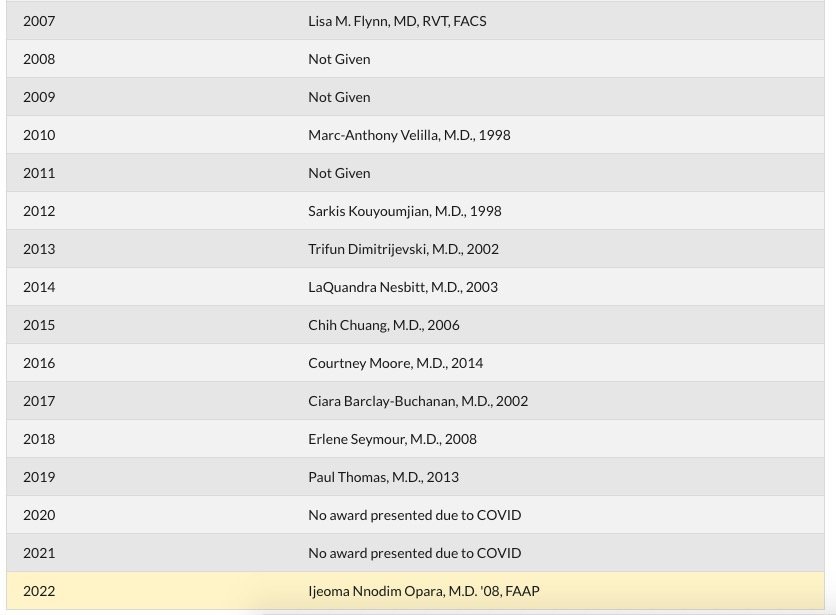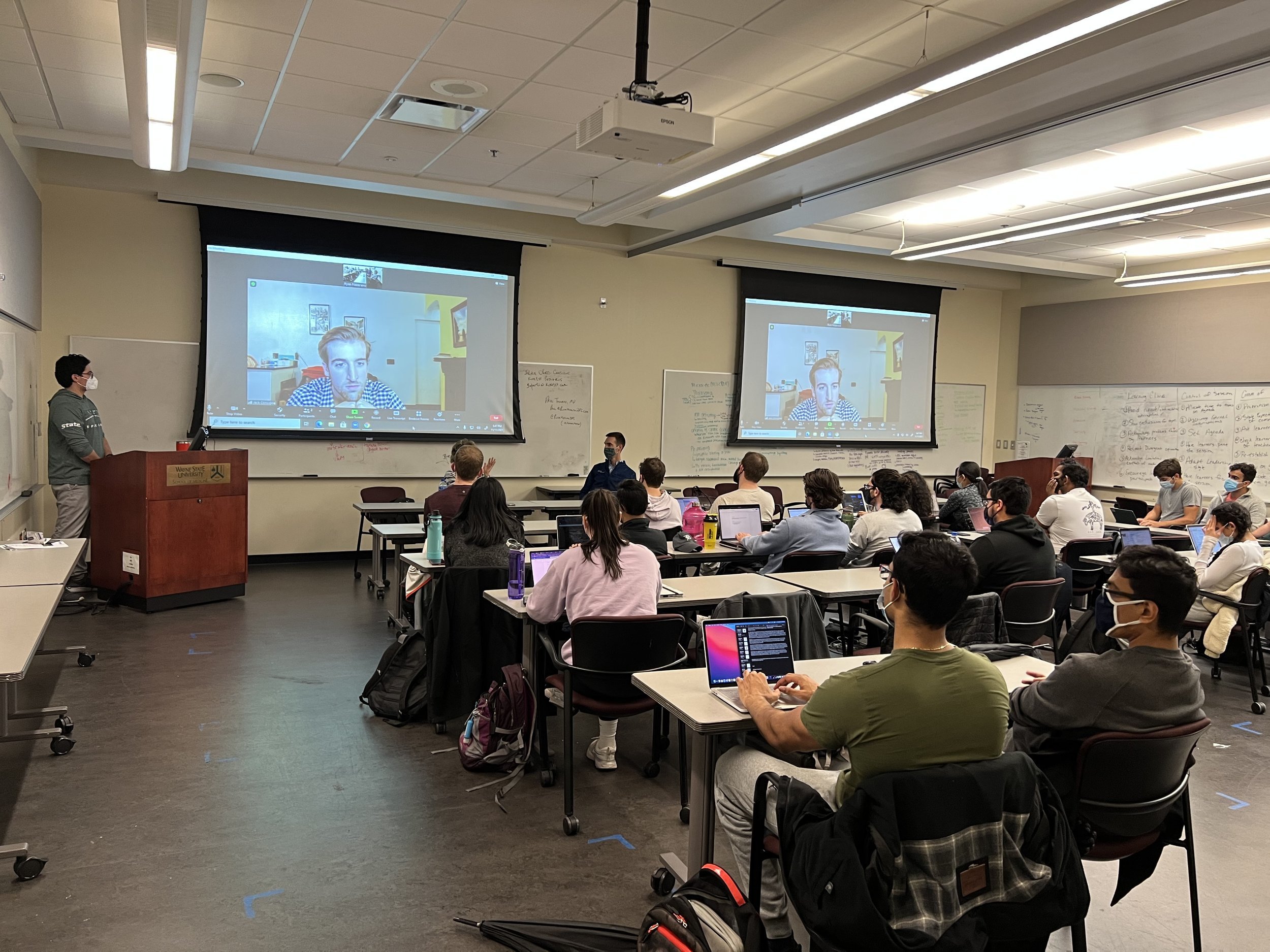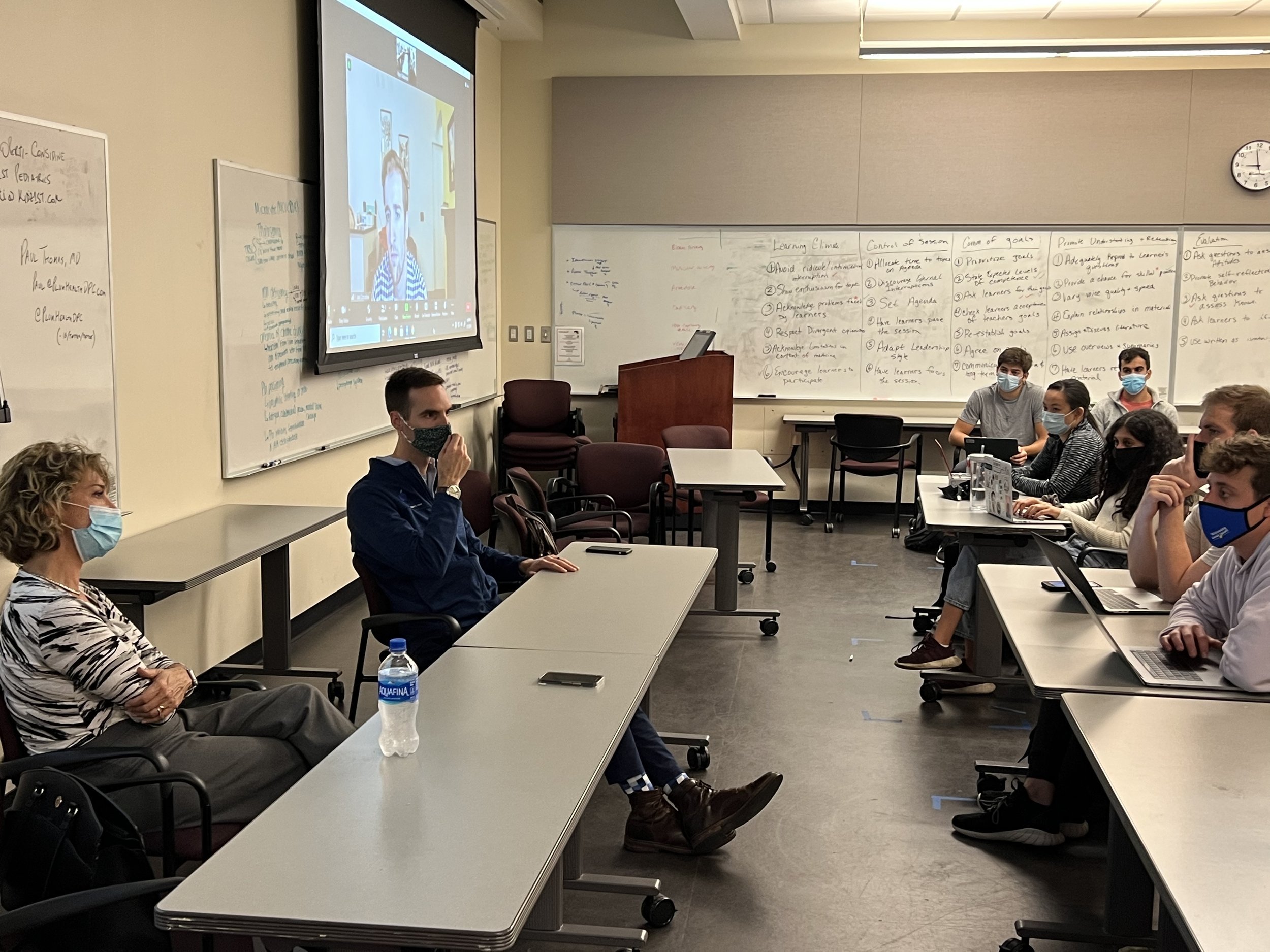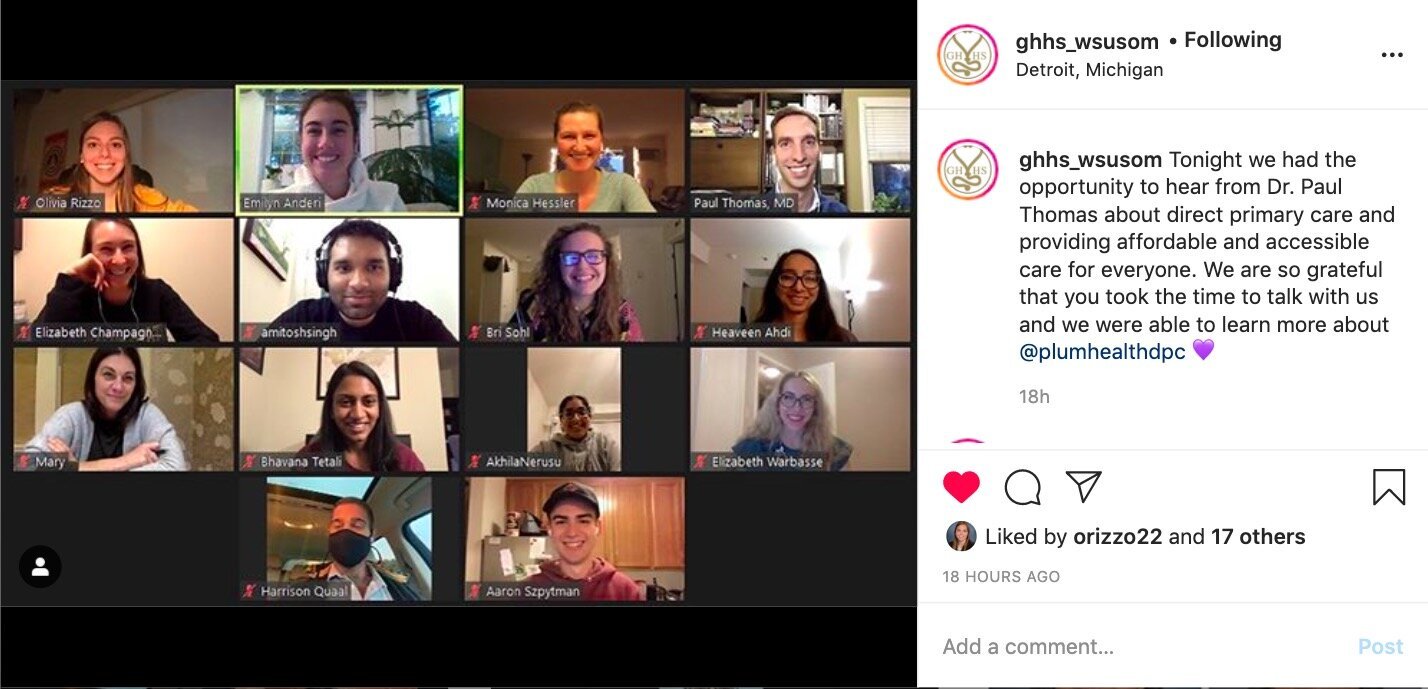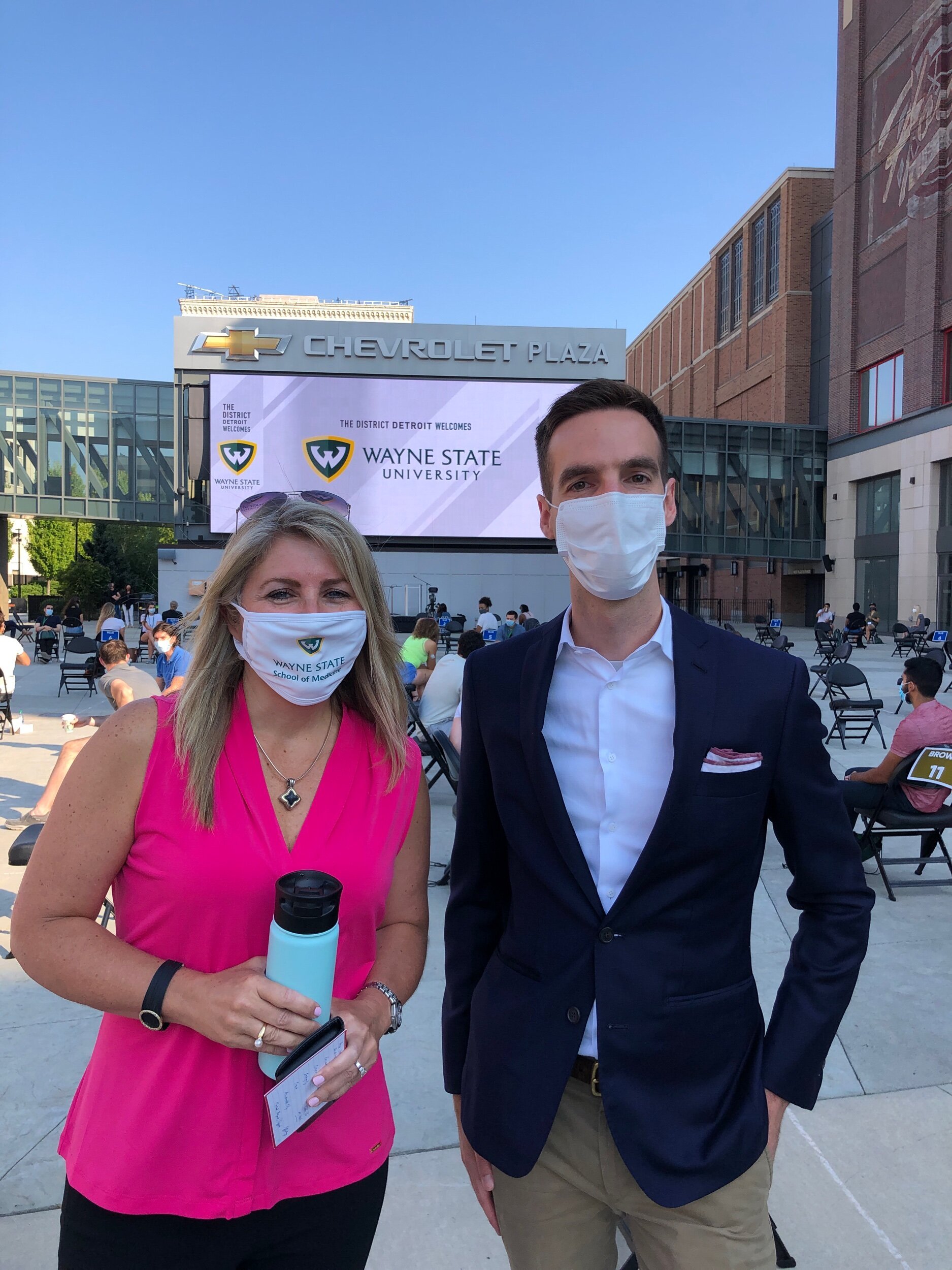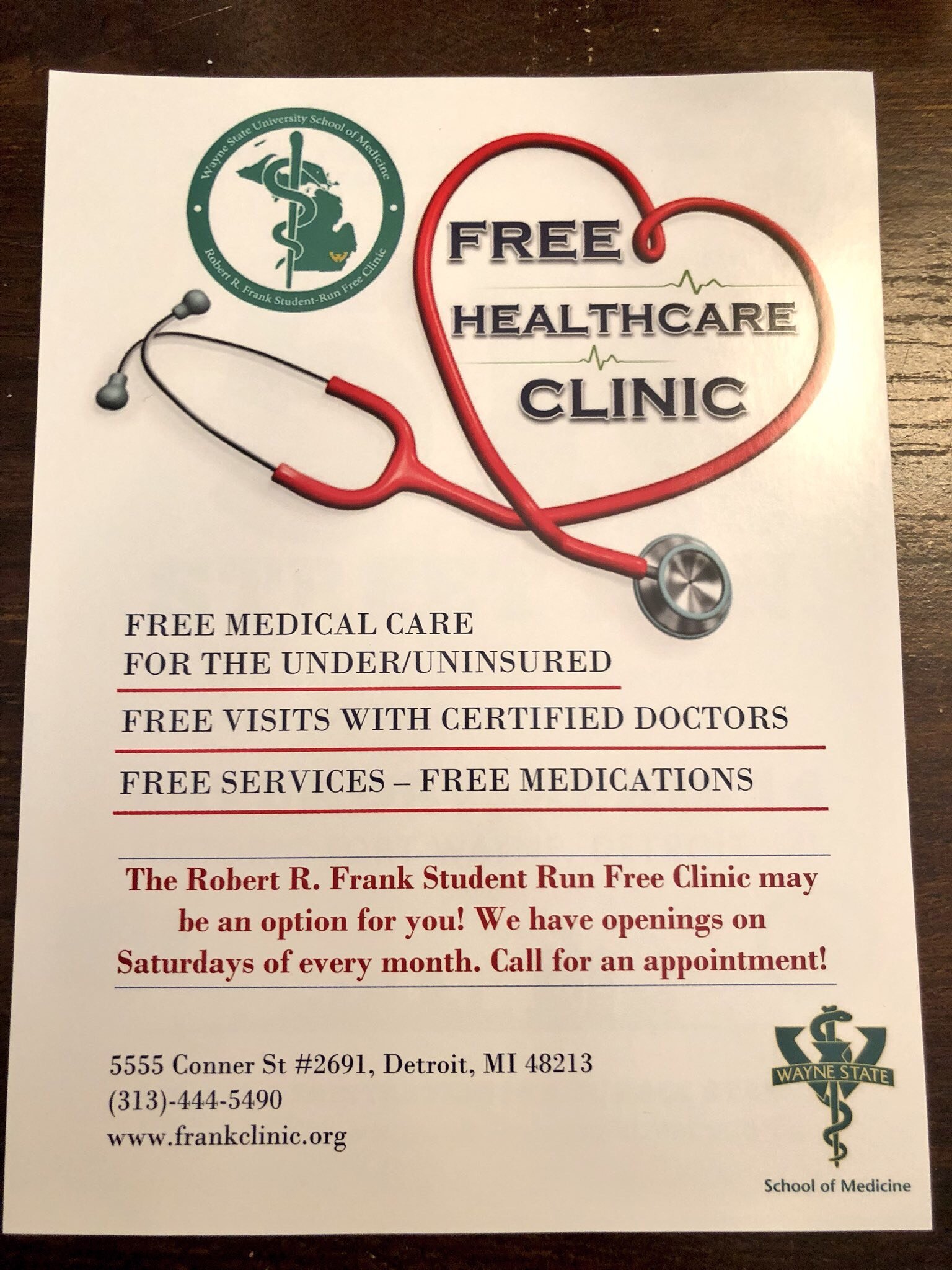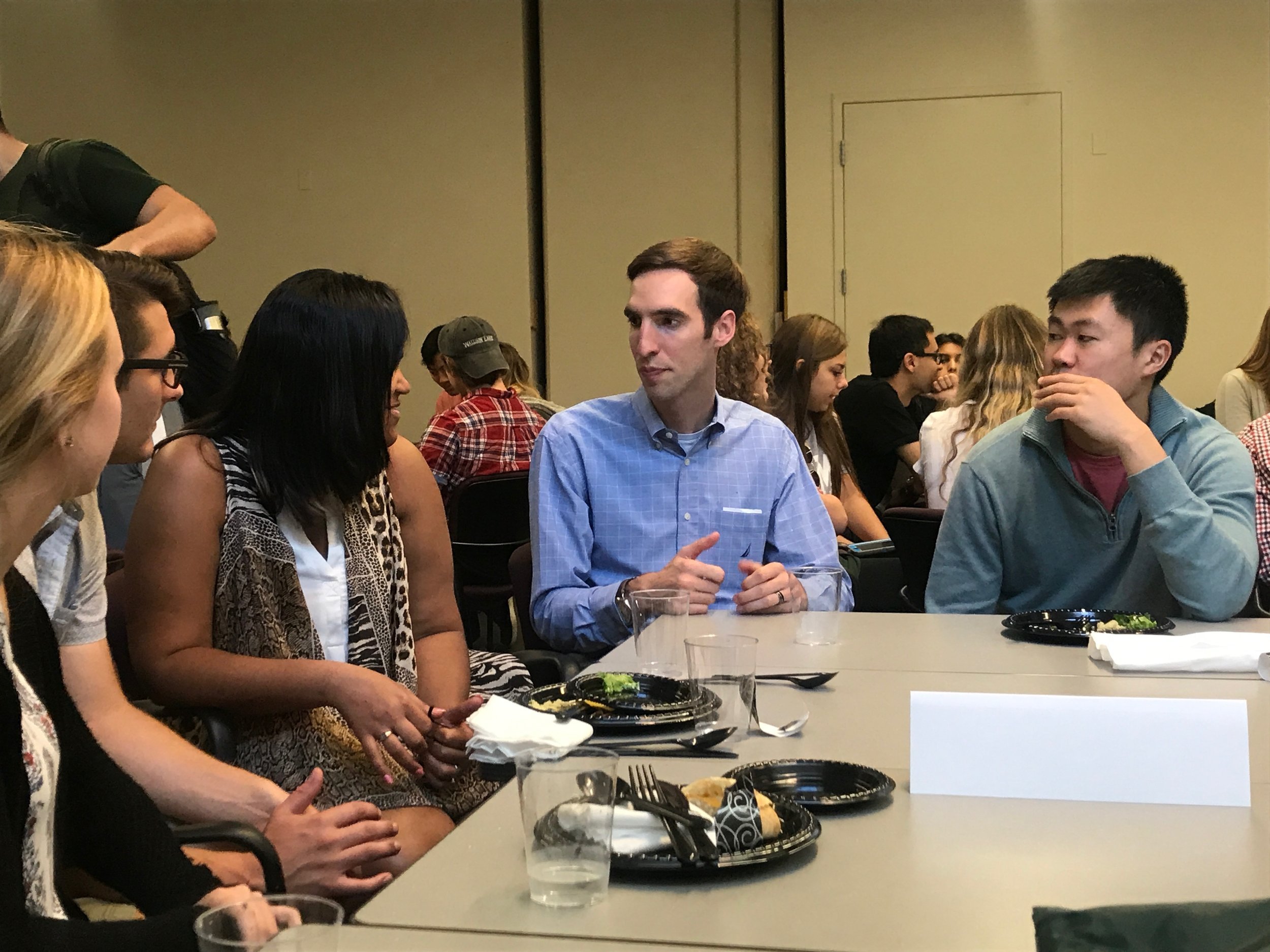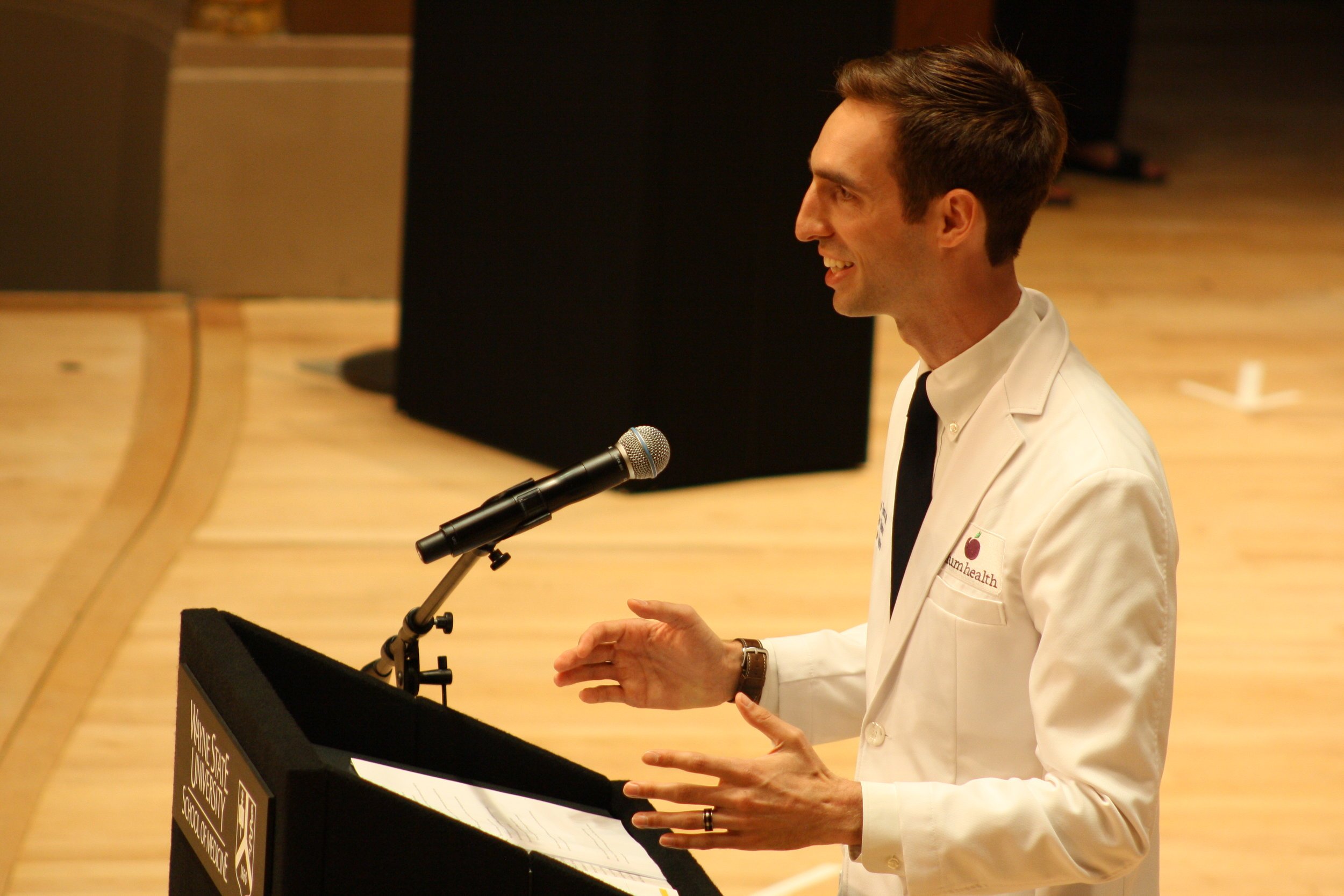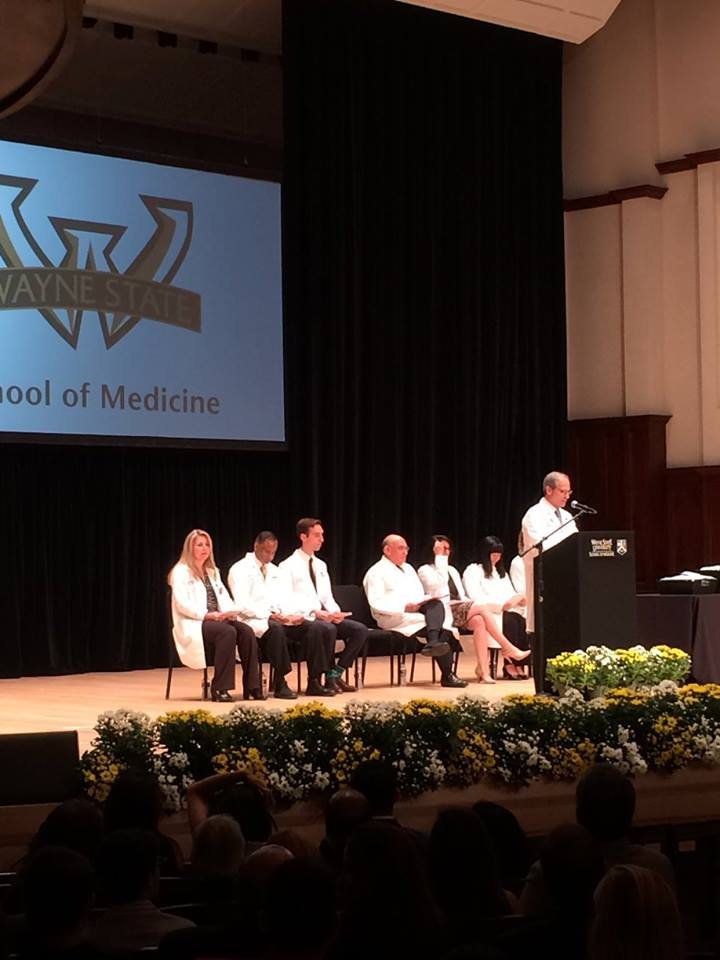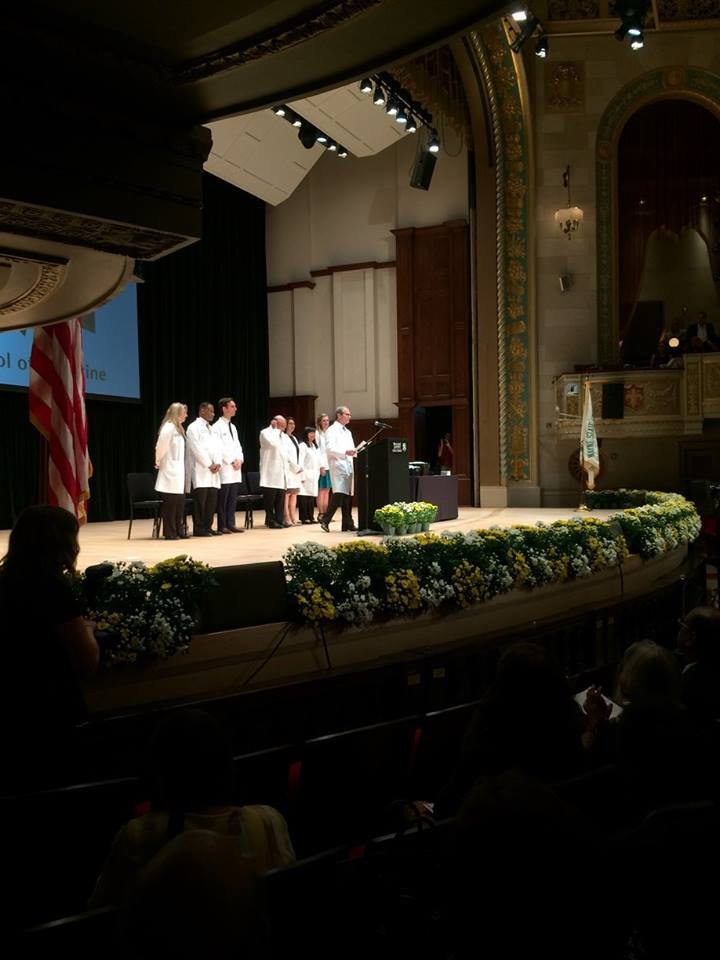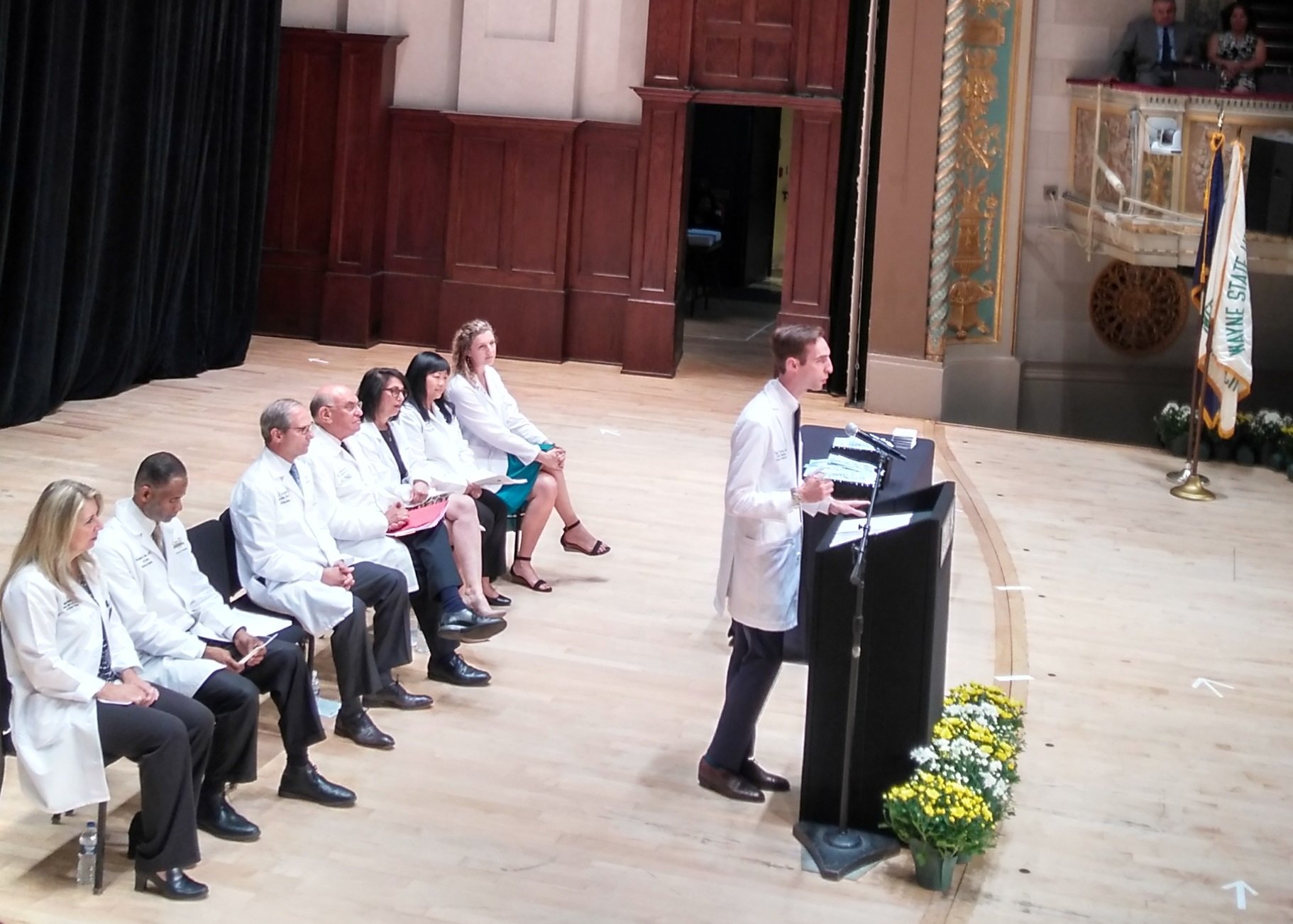Plum Health Blog
Dr. Paul Thomas Gives the Welcome to Detroit Lecture for Incoming Class of 2027 at WSU SOM
Dr. Paul Thomas Gives the Welcome to Detroit Lecture for Incoming Class of 2027 at WSU SOM
This year, Dr. Paul Thomas was invited to give a “Welcome to Detroit” lecture for the Wayne State University School of Medicine Class of 2027. These medical students will be immersed in the Detroit community over the next 4 years, and upon graduation, many of them will continue to serve the Detroit and Metro Detroit community.
WSU SOM’s incoming class of 2026 had 300 Students, with 192 in-state and 108 out-of-state students. That class had 22 birth countries and 94 different colleges represented. The 2027 class is likely similar but their demographic data isn’t readily available online.
That being said, the vast majority of these students are experiencing Detroit for the first time. The lecture given by Dr. Paul Thomas highlights important moments in Detroit history, from its founding through the Arsenal of Democracy, through 1967, municipal bankruptcy, and today. It also discusses cultural events, the best coffee shops to study, the best parks to relax and unwind, and the best restaurants for a student budget and for when parents or loved ones come to town for a special occasion.
A short guide for new visitors to Detroit and also for new professional students in Detroit, like medical students or law students at institutions like Wayne State University or the University of Detroit.
So here are the best coffee shops in Detroit for 2023:
Lucky Detroit in Corktown
Momento Gelato in Corktown (great coffee and paninis and gelato)
James Oliver in Corktown (amazing bagel sandwiches and great coffee selection)
Dessert Oasis in Capitol Park
Rosa in Grandmont Rosedale
Oloman Café in Hamtramck
Cafe 1923 in Hamtramck
MadCap in Downtown
The Congregation in New Center/Virginia Park
Milwaukee Caffe in New Center
Anthology Coffee in Eastern Market
Dr. Paul Thomas is a Proud Graduate of Wayne State University School of Medicine Class of 2013
This month, Dr. Paul Thomas attended the Class of 2013 Alumni Reunion Weekend. Dr. Thomas graduated from Wayne State University School of Medicine in 2013 - thereafter, he completed his residence at Oakwood/Beaumont Family Medicine Residency Program, and then started Plum Health DPC in November 2016.
Time flies when you’re practicing medicine - the days are long but the years are short. As physicians, we put our all into taking care of other people and making sure people in our community stay healthy. The School of Medicine’s Mission is as follows:
We will educate a diverse student body in an urban setting and within a culture of inclusion, through high-quality education, clinical excellence, pioneering research, local investment in our community and innovative technology, to prepare physician and biomedical scientific leaders to achieve health and wellness for our society.
It’s refreshing to connect with a group of doctors who share these values - all striving to improve the health and wellness of our community. I’m forever grateful to have been immersed in the culture of WSU SOM and my experiences there informed how I practice today and in the future at my practice, Plum Health DPC.
Paul Thomas, MD - Recent Alumni Award Recipient from Wayne State University School of Medicine
Paul Thomas, MD - Recent Alumni Award Recipient from Wayne State University School of Medicine
In 2019, Dr. Paul Thomas received the Recent Alumni Award from Wayne State University School of Medicine. This is a prestigious award that is not given out every year. Here’s how it’s described by WSU SOM:
The Recent Alumni Award, established in 2003, is presented to an individual who received an M.D. degree from the WSU School of Medicine within the last 15 years and has demonstrated outstanding professional achievement, community contributions or service to Wayne State University School of Medicine.
Here’s a list of the previous Recent Alumni Award Winners at Wayne State University School of Medicine:
Paul Thomas MD at Wayne State University School of Medicine for a Business of Medicine Elective Course Panel
Wayne State University School of Medicine Business of Medicine Elective Course Invites Dr. Paul Thomas to a Panel
Dr. Paul Thomas, a Wayne State University School of Medicine graduate from 2013, was invited to be a part of a panel discussing Business of Medicine. This was a group of medical students interested in the business side of medicine.
I was really happy to receive this invitation as it is my opinion that medical schools should focus more time in their curriculum to the business of medicine. Topics that ought to be discussed included how to attract patients, how to generate revenue, how to pick and use an electronic medical record, how to manage practice finances, how to start a PLLC or an LLC to operate your business or purchase real estate for your business, how to invest, etc… These skills would be transformational if all physicians were equipped with these business fundamentals.
Paul Thomas, MD of Plum Health DPC speaks to a group of medical students at Wayne State University School of Medicine During their Business of Medicine elective course.
During the course of the evening, we talked about all of the above topics and more, including the following:
How do you build and maintain a patient population in a private practice?
How do referrals work, and what do you focus on when building relationships with specialists when it comes to referrals?
How to decide on employee personnel (PA vs NP vs another MD/DO, MA's vs CNA's etc)
As a growing practice, how do you gain buying power against large healthcare establishments?
Other than telemedicine, what changes from COVID do you foresee staying/playing a role long term?
It was an excellent conversation and I was happy to share my knowledge and insights in these areas. After the event, I received the following thank you.
On behalf of the students and myself, a sincere and grateful 'thank you' for the gift of your time and your insights last evening.
During this very informative and engaging discussion you helped these first-year medical students gain a better understanding of many of the business issues involved in establishing a direct primary care practice. Your entrepreneurial skills were very evident, and we are thrilled they had a chance to get to know this other side of your story.
It was great to observe the ease with which you engaged with the students, and we all benefited from the breadth and particulars of the discussion. The discussion continued after you left, and I am certain the students will continue to benefit from the opportunity to hear about your fascinating journey and will take to heart the advice you gave.
In closing, it’s great to see medical students engaged in the Business of Medicine, as if we want to create a more compassionate health care system, we need to fundamentally change the business models that we use to deliver health care services. Hopefully these students will be apart of that change for the better.
-Dr. Paul Thomas with Plum Health DPC
Congrats to the WSU SOM Class of 2021!
Congrats to the Wayne State University School of Medicine Class of 2021
Congrats to the Wayne State University School of Medicine Class of 2021 as they become Doctors this week! It takes 10,000 hours to become an expert in any given field of study, and these new graduates have definitely put in the time over this 4 year journey and course of study. We wish you the best as you embark on Transitional Years, Internship, Residency, Fellowship, and your practice years beyond these years of additional training.
What it takes to become a Family Physician
For those of you unfamiliar with medical education, to become a board certified family medicine physician, it takes four years of undergraduate or college study, four years of medical school training, and at least three years of residency training. That comes out to 11 years of higher education after high school to become a board certified family medicine physician.
At Plum Health, we’re incredibly lucky to work with a team of four board-certified family medicine doctors. To learn more about our team, check them out here.
Dr. Paul Thomas Speaks with Wayne State Medical Students About Lowering the Cost of Health Care
This week, I was invited to speak with Wayne State University School of Medicine students who are interested in the Direct Primary Care model and who are interested in how the model makes health care more affordable and accessible.
During this session, I talked with the students about the current problems in the United States Health Care System, the challenges that doctors face when taking care of patients, and the solutions that the Direct Primary Care model offers.
The students asked some excellent questions during the question and answer session.
Thanks for watching,
- Dr. Paul Thomas with Plum Health DPC in Detroit, Michigan
Dr. Paul Thomas Speaks with The Gold Humanism Honor Society at Wayne State
This week, I had the privilege of speaking with the medical students who make up the Gold Humanism Honor Society at Wayne State University School of Medicine. Here’s what they had to say about it:
Tonight we had the opportunity to hear from Dr. Paul Thomas about direct primary care and providing affordable and accessible care for everyone. We are so grateful that you took the time to talk with us and we were able to learn more about @plumhealthdpc 💜
When I was a medical student at WSU SOM, I was a part of the Gold Humanism Honor Society. Here’s what they’re all about:
The Gold Humanism Honor Society Chapter at Wayne State University School of Medicine was founded in 2005. We strive to embody the following tenets:
Excellence in patient care and advocacy
Compassion for patients and their families
Professionalism and leadership among colleagues, students and staff
Commitment to teaching students
Devotion to promoting humanism in medicine through behavior and attitude
Throughout my training and career in medicine, I’ve worked to cultivate my compassion for others and humanistic approach to medical care. Speaking with students is always a great reminder of the attributes that make up a kind and caring physician, so it was great to be invited to talk with these students.
Thanks for reading and have a great day,
-Dr. Paul Thomas of Plum Health DPC
Dr. Paul Thomas Welcomes 300 New Medical Students to Detroit
Last week, Dr. Paul Thomas welcomed 300 new medical students to Wayne State University School of Medicine. Typically, the incoming students are packed into a large lecture hall at WSU SOM’s Scott Hall. But this year, due to Coronavirus, the event was held outdoors at Chevrolet Plaza, adjacent to the Little Caesars Arena. This open air venue accommodated 100 medical students at a time, and there were three “Welcome to Detroit” sessions throughout the day.
Dr. Paul Thomas gave a “Welcome to Detroit” lecture to the incoming medical students that emphasized the significant history and culture of the City of Detroit. There are so many opportunities for students to immerse themselves in service learning, by volunteering at local free clinics and by giving back to Detroit and the surrounding communities, by working with grade school students and the elderly, by volunteering at food banks and soup kitchens.
Dr. Paul Thomas shared a quote from Jeanette Pierce, “Detroit is big enough to matter in the world, and small enough for you to matter in it.”
Wayne State University School of Medicine Dean Margit Chadwell with Dr. Paul Thomas, MD, guest lecturer and Clinical Assistant Professor.
Paul Thomas MD Presents at Grand Rounds at Wayne State
On February 15th, I had the honor of presenting at Grand Rounds at Wayne State University School of Medicine. Grand Rounds is a weekly presentation and an integral part of medical education. Clinical problems in medicine are discussed by focusing on current or interesting cases. Grand Rounds presentations can also be used to disseminate new research or interesting changes in the healthcare landscape.
For this Grand Rounds for the Internal Medicine Department at Wayne State University, I was asked to share my expertise regarding Direct Primary Care. This is a presentation that I have given in the past to the Michigan Academy of Family Physicians and at Oakland University William Beaumont School of Medicine. I updated the presentation to include a clinical case, or a person in our practice who I helped by managing their diabetes and hypertension. The personal information is anonymized to protect their identity.
It was a tremendous honor to be invited by my alma mater to give a presentation of this magnitude, and I’m happy to share this information about Direct Primary Care. I believe that healthcare should be affordable and accessible for everyone, and we will need more doctors to adopt Direct Primary Care practices to meet this goal.
Thanks for reading and watching,
-Dr. Paul Thomas of Plum Health
Wayne State University School of Medicine History Presentation
Our video has been posted online! I had the opportunity to present the history of Wayne State University School of Medicine, and it is now available as a YouTube video. Check it out, below.
Thanks for reading and watching!
- Dr. Paul Thomas with Plum Health DPC
The History of Wayne State University School of Medicine
This week, I was invited to give a presentation on the history of Wayne State University School of Medicine during its Sesquicentennial Celebration. Yes! The WSU SOM is 150 years old, and it has a rich history of diversity, inclusion, and innovation that should be celebrated. Interestingly, the history of the Medical School is the history of the University, as the University grew out of the Medical School. While I can't cover the entire history in a single blog post, I will give some highlights from the early years of the college below. When the full presentation is released later this year, I will post it to the blog as well.
Theodore A. McGraw, MD, founder of the Detroit Medical College, which would later become Wayne State University School of Medicine.
The Detroit Medical College was founded in 1868 by five returning Civil War Veterans. One can only imagine the horrors that they saw on the battlefield and you can also imagine the inadequacy that they felt in treating wounded soldiers. In the 1860's, aseptic surgical techniques were only beginning to be used and anesthesia was not fully understood.
Can you imagine what it might have felt like to be a battlefield clinician, and not having the proper tools or training? Dr. Theodore McGraw, founder of the Detroit Medical College is quoted as saying: "I had discovered in my two years of army activity that I was deficient in that exact knowledge of anatomy that was essential to good surgery. The advent of antiseptic and aseptic surgery, besides, had opened a new field for operative work, that of the abdomen, which demanded a study of anatomical relations which had never been taught in the schools."
Dr. Theodore McGraw was focused on both teaching and learning, and that desire is summed up in this quote "We entered into the matter with unbounded enthusiasm – enthusiasm for teaching and developing ourselves."
To this end, the charter of the Detroit Medical College elucidated how this would be achieved. In the charter (pictured below), it is written that "Pains will be taken to instruct each Student in PRACTICAL DIAGNOSIS. For this purpose the advanced Students will be called upon in turn to examine patients. After pronouncing a Diagnosis, questions will be asked in relation to differential symptoms... ...Little benefit can result to the Student from seeing cases diagnosticated and treated by the Professor of Practical Surgery and Medicine, unless he is first allowed to exert his own powers, and test his own knowledge, by personal examination of the patients."
The Detroit College of Medicine charter from 1868, signed by founding physician Thodore A. McGraw, MD. The charter puts forth the founding principles of the institution.
This ethos of having students practice medicine, to serve the community, and to learn by doing, echoes throughout the history of the School of Medicine. This is the very foundation of the University and the key to its enduring greatness. It is also the reason that I chose to attend WSU SOM - I wanted to immerse myself in the diversity of the city and the breadth of clinical opportunities available in Detroit, from serving homeless and uninsured patients in community clinics to learning from some of the leading minds and researchers in the country at the University clinics.
At its inception, the Detroit Medical College set up a relationship with Harper Hospital and St. Mary's Hospital, which allowed students to learn from and serve the people of Detroit. The focus is, and has always been, learning by doing. The early photos below illustrate these tenets.
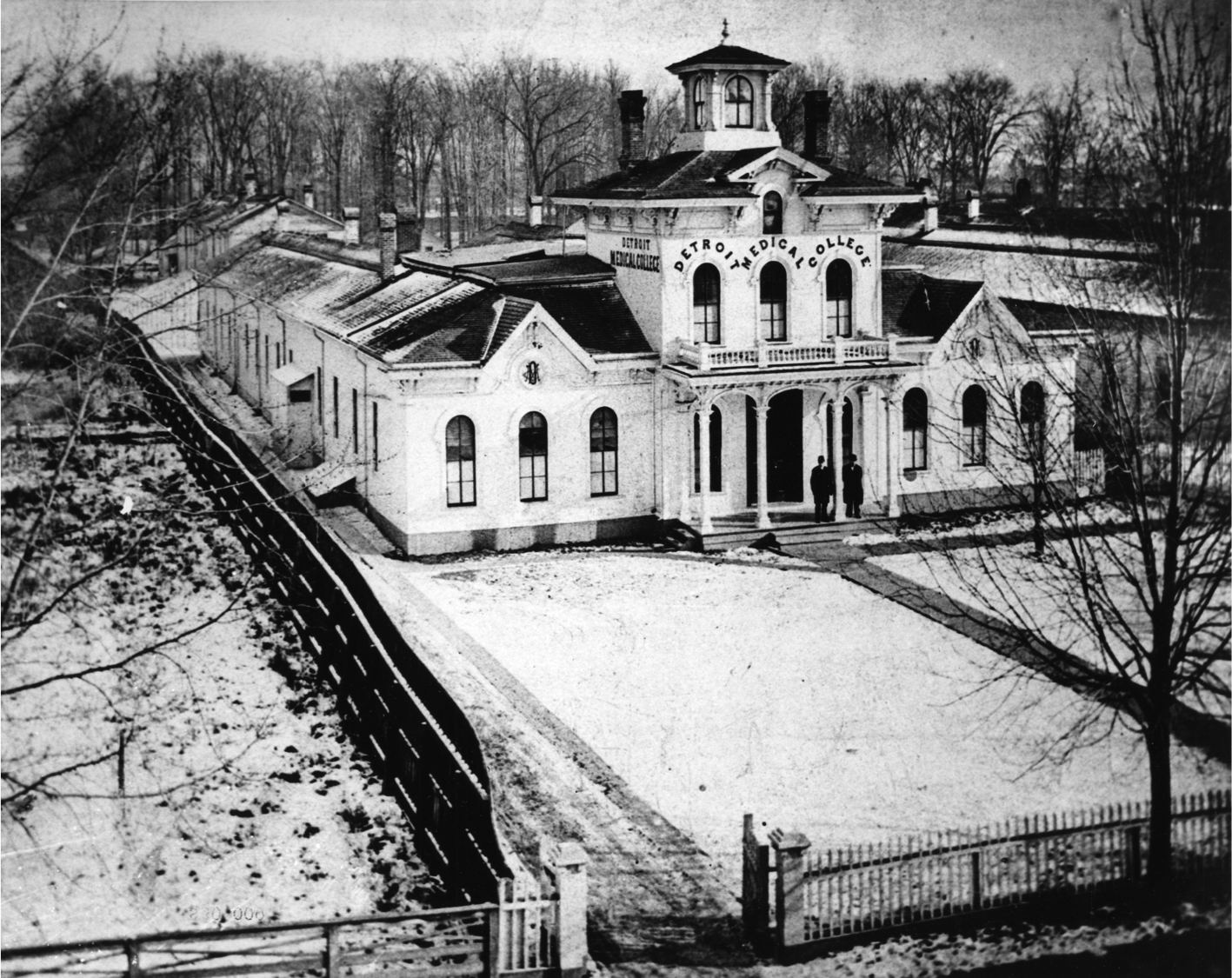
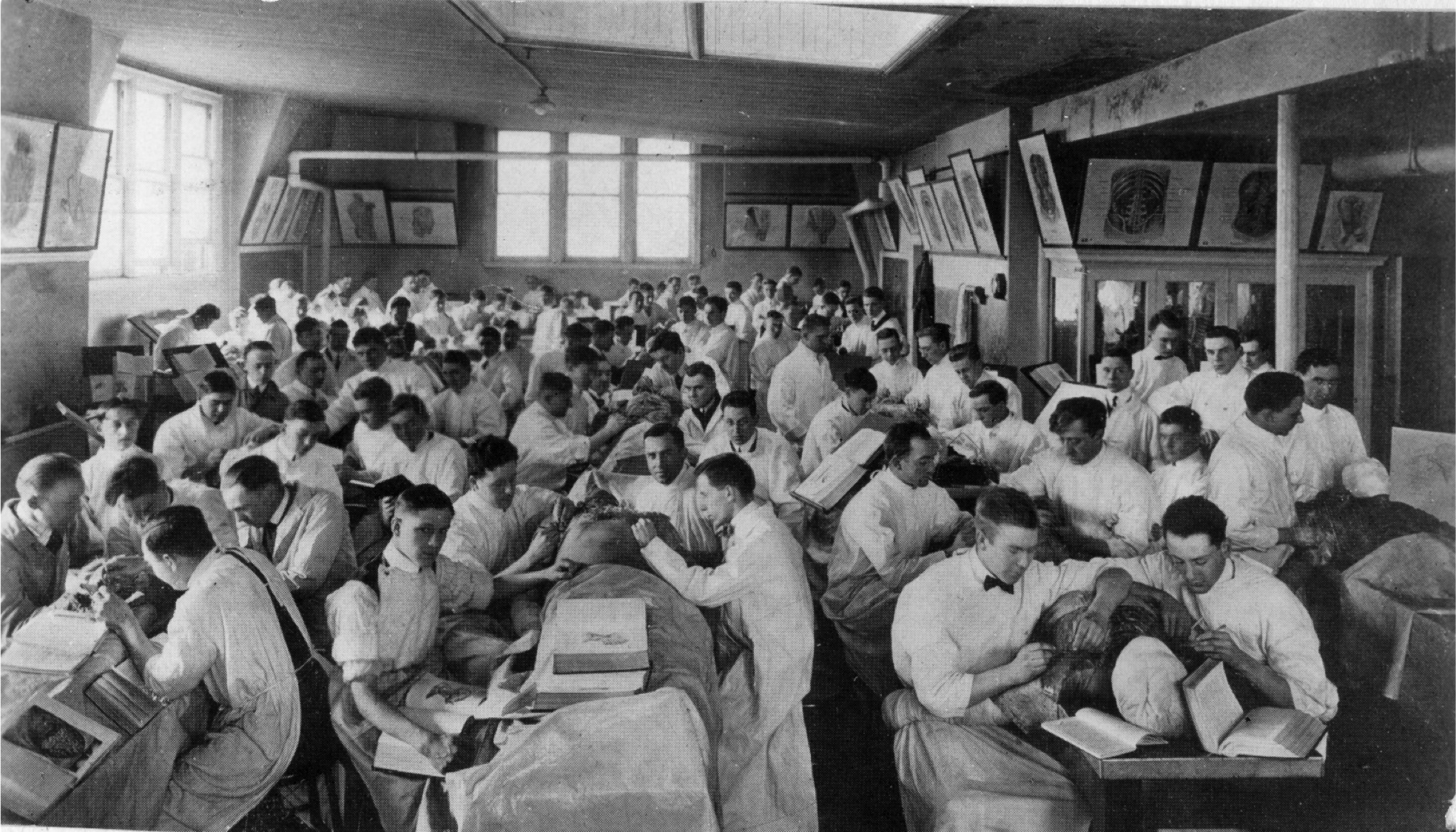
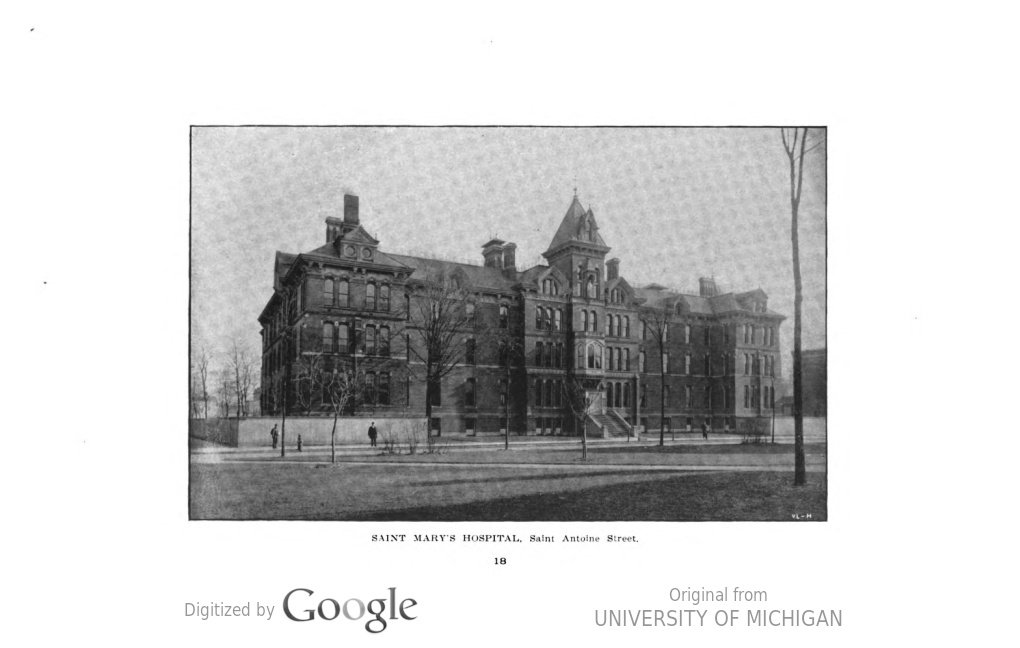
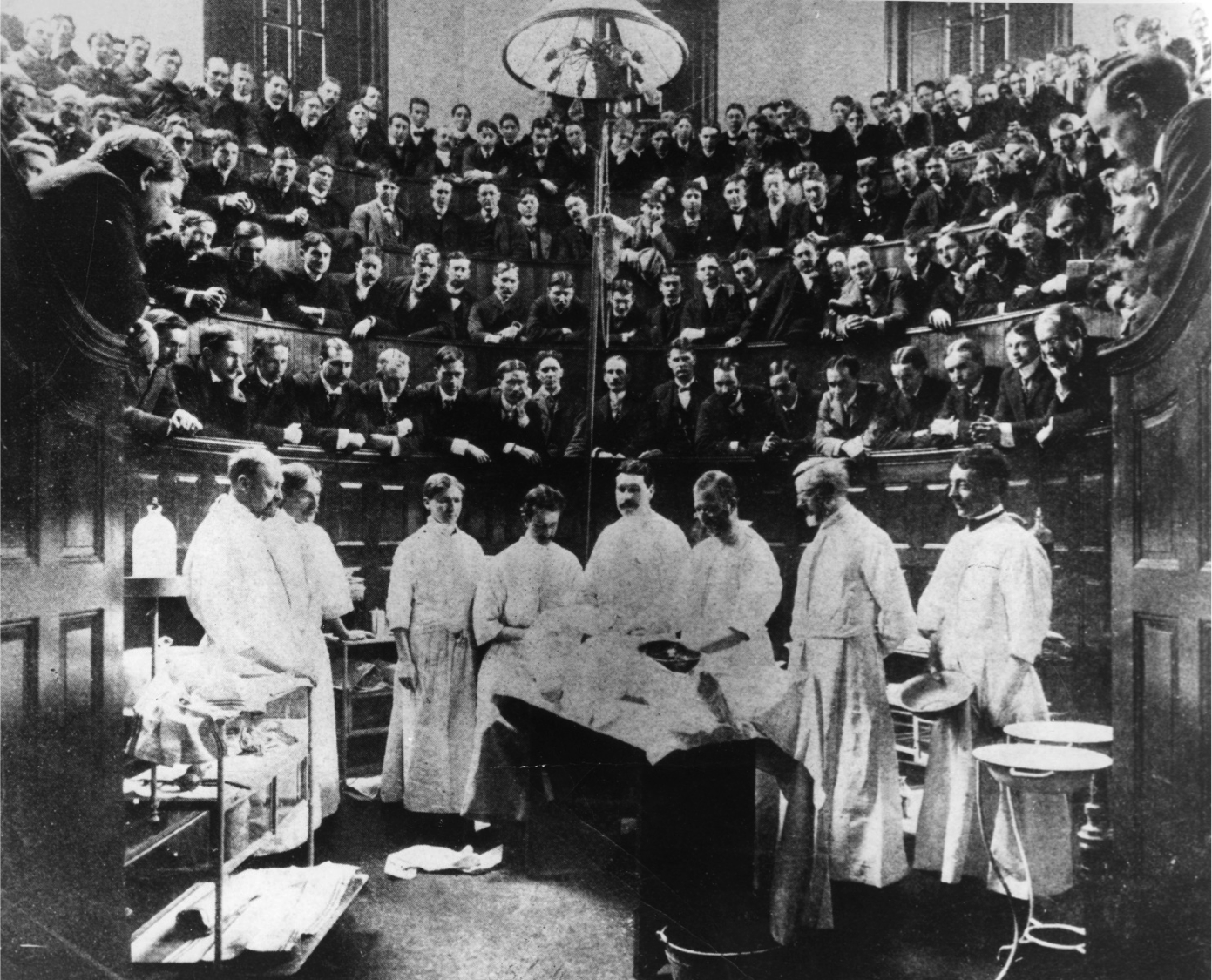
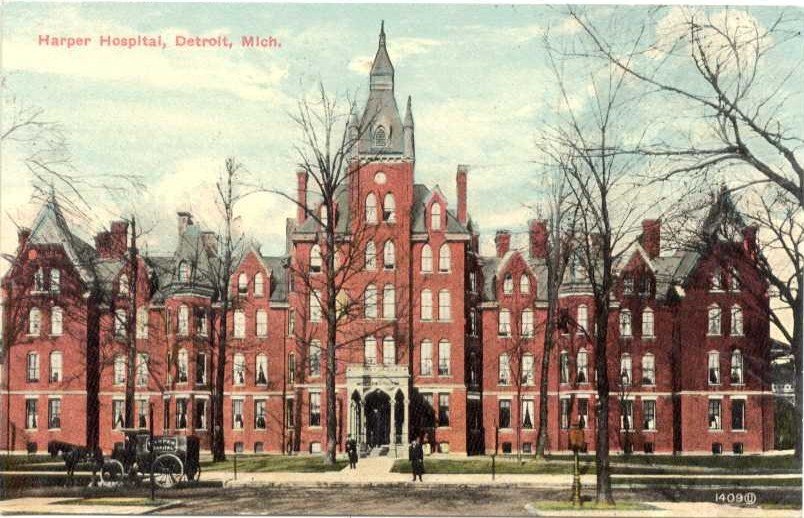
The above photo series include the following images: first is the Detroit Medical College, which housed the medical school after 1868, the second image shows students during anatomy lab sometime around 1900, which is not very different than anatomy lab at the School of Medicine today. The third image is St. Mary's Hospital, one of the two clinical training sites after 1868. The fourth image is the operating theater at St. Mary's Hospital in 1898. The Operator is Dr. Henry O. Walker. At his left, hands behind his back, is Dr. Theodore McGraw, the founder of the Detroit Medical College who emphasized teaching by doing. The final image is Harper Hospital, the primary clinical training site for students at the Detroit Medical College.
It was an honor to be able to relay the history of Wayne State University School of Medicine to my physician colleagues this weekend, and it is a great reminder of what makes doctors from Wayne State unique and so skilled - the focus on hands-on clinical training and the diversity of the people we have the privilege of serving.
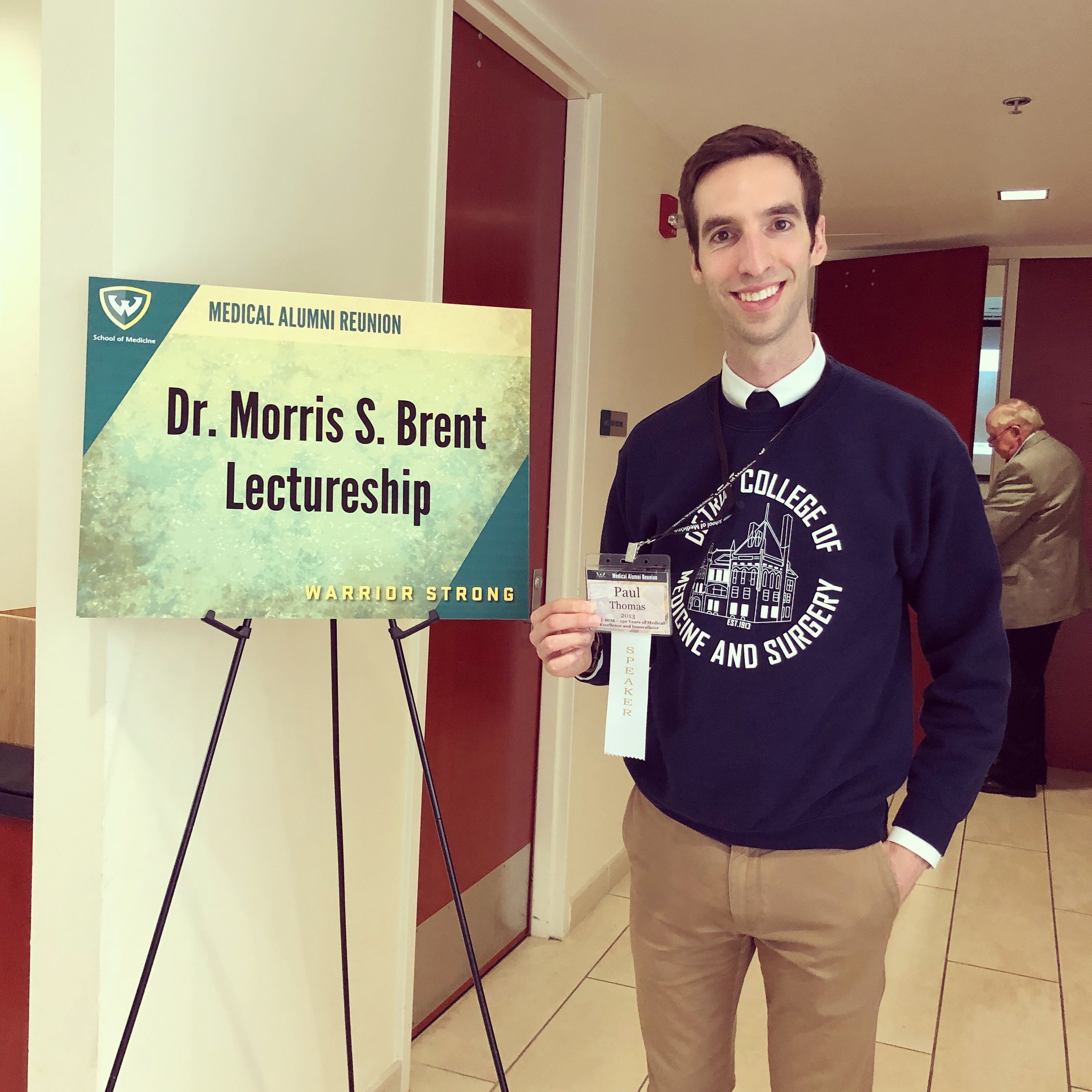
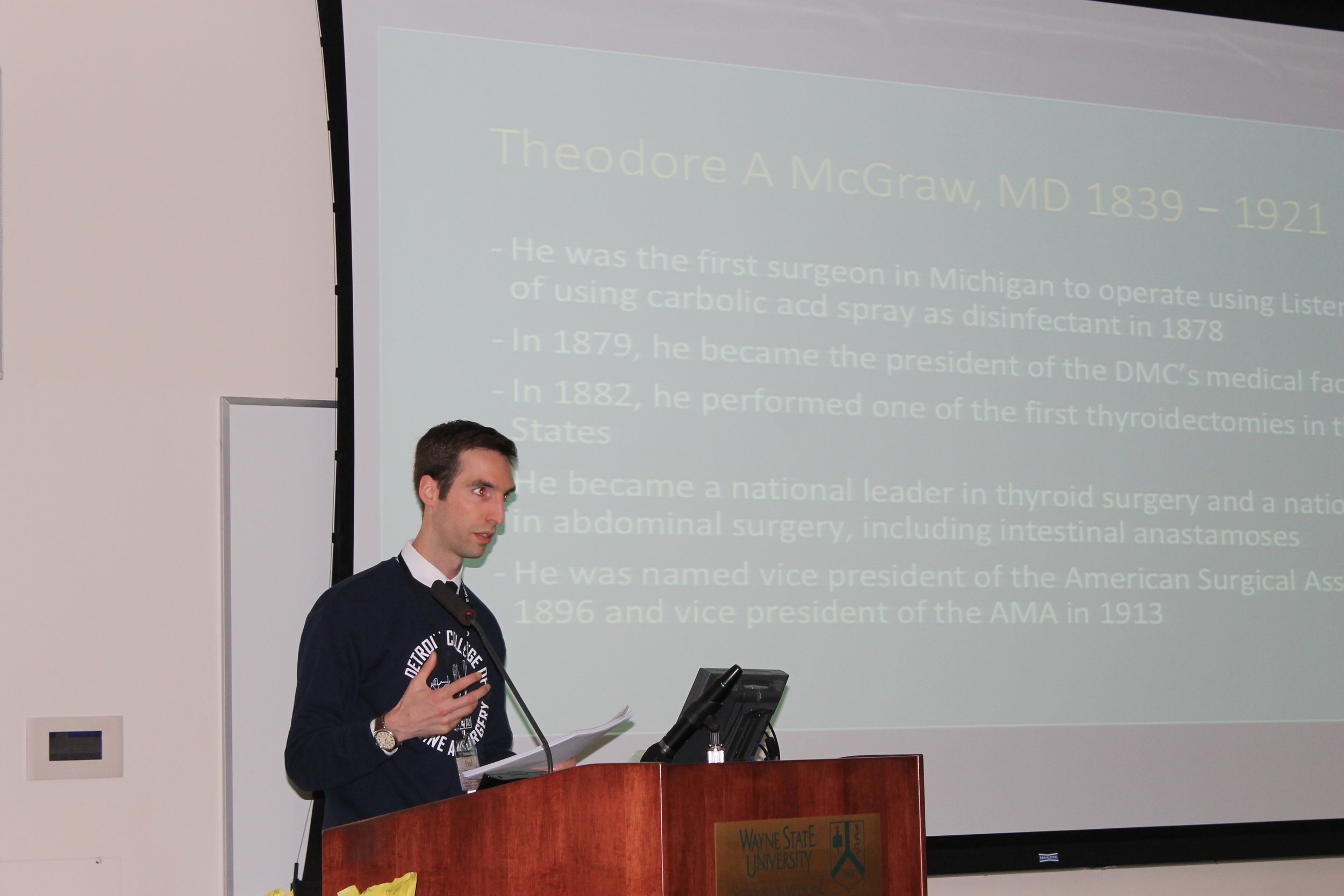
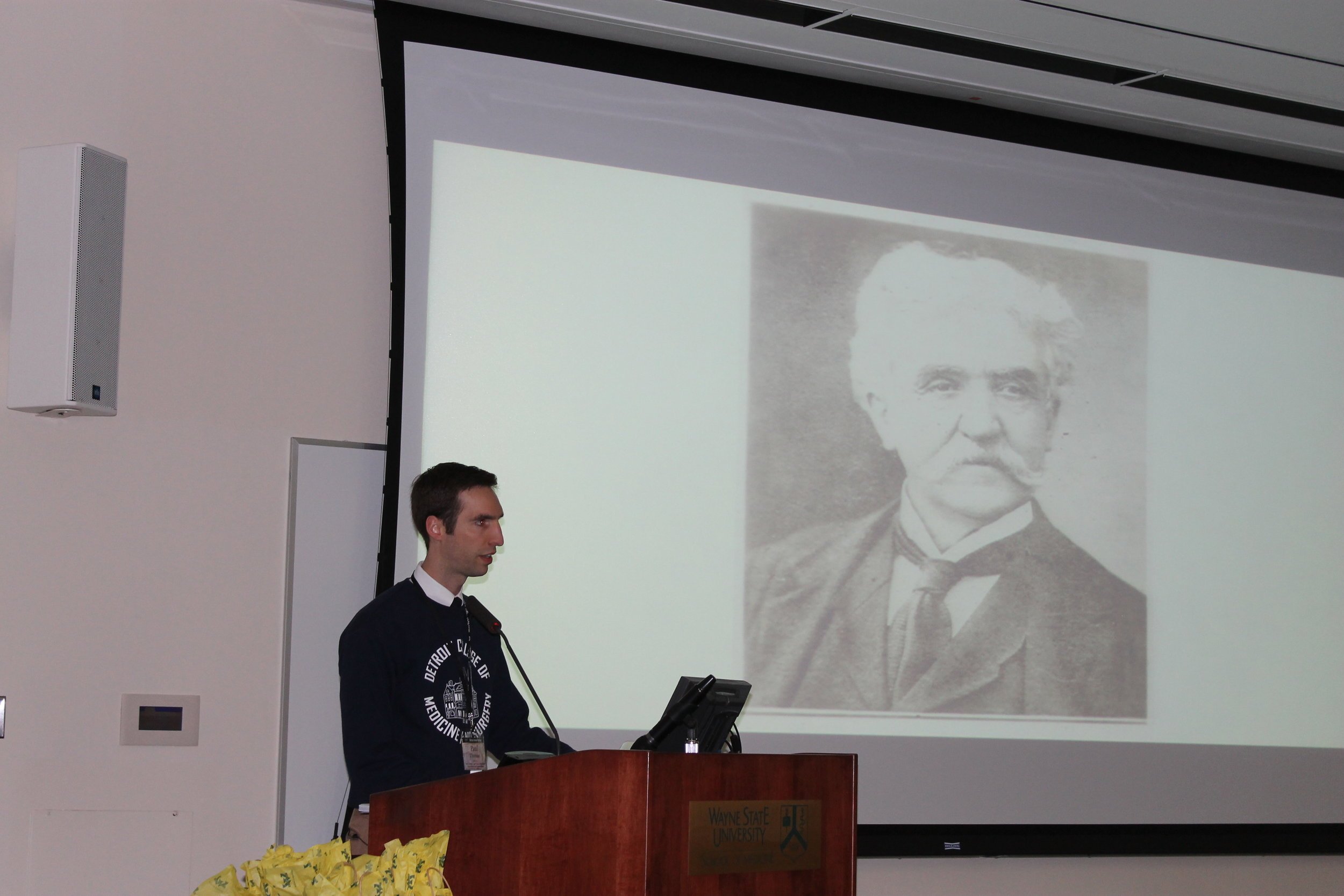
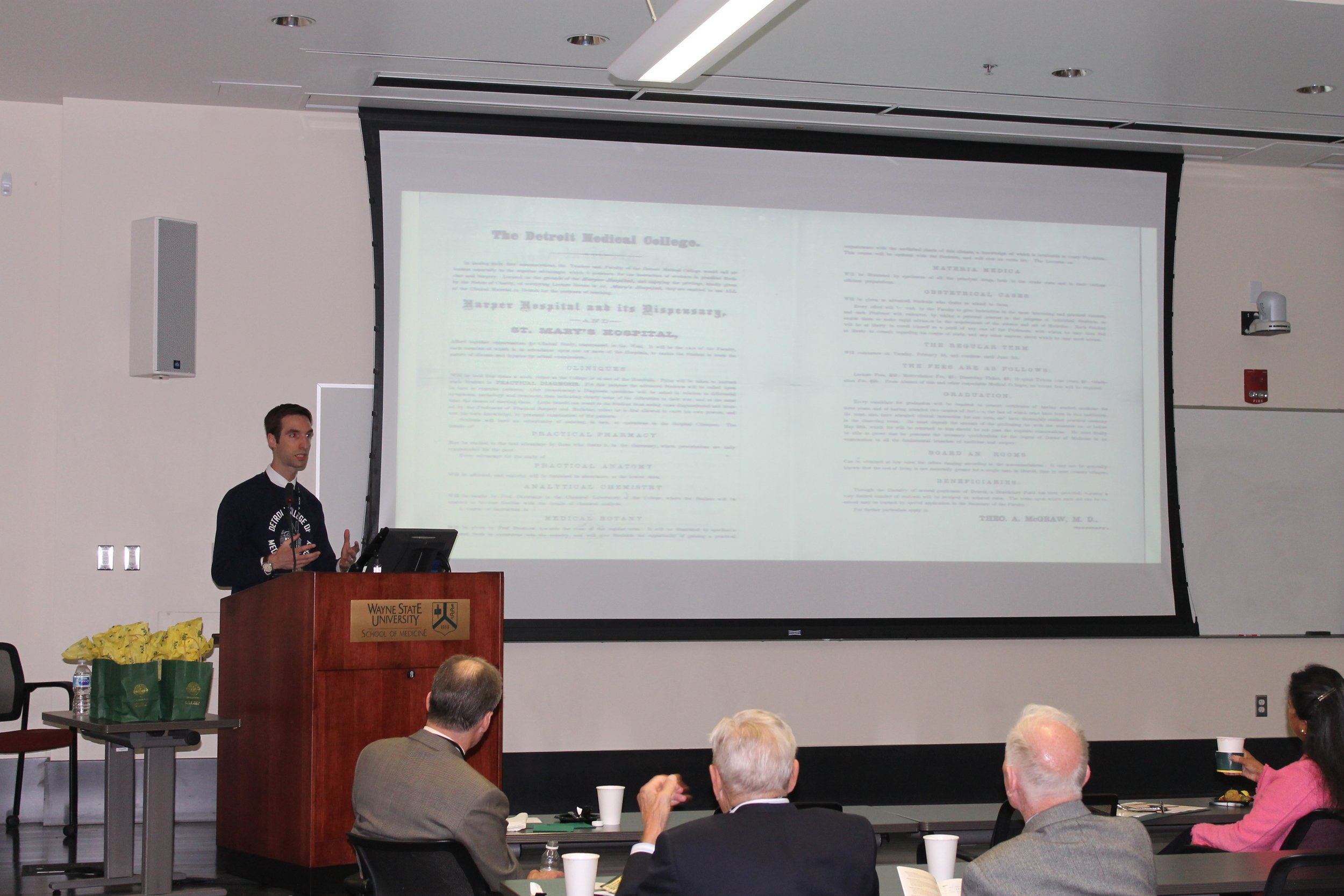
Thanks for reading,
- Dr. Paul Thomas, Physician with Plum Health DPC
Detroit Medical Students Run a Free Medical Clinic
For the last 6 years I've been volunteering at a free medical clinic on Detroit's East Side called the Robert R. Frank Student Run Free Clinic or the SRFC. The SRFC services Detroit residents who are uninsured, and as their name implies, it is run by medical students.
Last night we had a stakeholders meeting and I am continually impressed by these medical students and their diligence, commitment, and compassion.
If you'd like to help these students serve more uninsured Detroit citizens, you can donate here, participate in their upcoming 5K, or participate in their upcoming Golf Outing (date TBD).
Morris S. Brent Lectureship at Wayne State Medical School
I'm excited to announce that I will be giving a lecture to my medical colleagues at Wayne State University School of Medicine's Sesquicentennial Celebration. A part of that Sesquicentennial Celebration is the Medical Alumni Reunion Weekend, which features the Dr. Morris S. Brent Lectureship.
Image taken from Wayne State University's website, https://alumni.med.wayne.edu/mard
My topic is "WSU SOM - 150 Years of Medical Excellence & Innovation" and I'm proud of the rich history of Wayne State. A few notable facts:
- What is now WSU SOM was originally founded as the Detroit Medical College by five US Civil War Veterans in 1868, thus 2018 is the year of the Sesquicentennial Celebration
- WSU SOM is the birthplace of the mechanical heart pump used in the world's first successful open heart surgery in 1952; it was a collaboration between General Motors and Forest Dodrill, MD
- In 2015, WSU SOM remains on the forefront of medical research as they opened the Integrative Biosciences Center, which aims to study and eliminate the health disparities affecting Detroit's residents.
After the break, there is a description of the Morris S. Brent Lectureship series in greater detail. Thanks for reading, and have a great day,
- Dr. Paul Thomas with Plum Health DPC
The Dr. Morris S. Brent Lectureship was established at the Wayne State University School of Medicine in 1989 by Brent General Hospital in honor of the late Morris S. Brent, M.D., to provide quality lecturers for continuing medical education during Medical Alumni Reunion Day. Dr. Brent, grew up in Detroit, attended Cass Technical High School and received two degrees from Wayne State University, a bachelor's degree in 1927 and a medical degree in 1931. He spent much of his career in general practice, specializing in surgery and obstetrics. In 1942, he founded Brent General Hospital, a non-profit corporation, and served as its administrator until his retirement. He married Anne, a dental hygienist, and they had two sons, Burton Brent, a graduate of Chicago Medical School, and Robert Brent, a graduate of the WSU School of Medicine (Class of 1960).
The Dr. Morris S. Brent Lectureship will take place in the Richard J. Mazurek, M.D., Medical Education Commons Margherio Family Conference Center. This year's program provides continuing medical education credits and feature presenters from our own Wayne State family of physicians who will speak on a variety of interesting topics.
Mentoring Students at Wayne State University School of Medicine
Part of my mission, part of the "why" behind what I do, is to educate medical students and inspire them to choose a career in primary care specialties. Primary care doctors have the greatest impact on their communities, have the most tools at their disposal, and are most able to bend the cost curve in the health care ecosystem.
As a part of that mission, I spend a good amount of time interacting with medical students at Wayne State University School of Medicine (WSUSOM). This week, I took part in two different events at WSUSOM. The first was a mentoring session for first year students and the second was a mock interview session for the fourth year students.
For the first year students, it's an opportunity to get to know each other, learn from each other, and to be a resource. For the fourth year students, it's an opportunity to help them polish their interviewing skills as they prepare for the next step in their careers - residency!
This next generation of doctors will face significant changes and challenges in the health care system - from greater automation, to precision medicine, to even Artificial Intelligence. I hope that I can be a part of the foundation along with their formal education at WSUSOM that sets them on the right path to success in medicine.
Thanks for reading, and have a beautiful day,
- Dr. Paul Thomas with Plum Health DPC
A Golden Apple in My Office
This week, I was taking care of a family of 6 in my office! There was a lot of joyful movement and one of the toddlers grabbed an item from its resting place- it's an Apple, a Golden Apple, that I keep on my shelf and it's a reminder of my mission, vision, and values.
When I was in medical school at Wayne State University, I was awarded with the Golden Apple Student Award for having an understanding of the Art of Medicine as displayed by the care and understanding of patients. It was a tremendous honor, and it's something that I carry with me, as well as something that I want to give to my patients and reflect in my practice.
Often, my patients will ask me about the best course of action going forward, and sometimes the answer isn't always clear. You see, there's the science of medicine, the reproducible, empiric evidence with its best practices and treatment recommendations. These guidelines are important to know and important to follow in most cases. But, on the other side, is the Art of Medicine, and because every one is unique, an individual, with unique medical concerns, treatment choices aren't always clearly defined.
When difficult choices need to be made, I often ask my patients which course of action they'd like to pursue. This may be a unique aspect to my practice, but I know that it's important to engage in shared decision-making with the people that I care for. When decisions are made together, we can be on the same page about treatment, compliance to the plan is higher, and people feel like they have more control over the condition and situation.
Thanks so much for reading and have a wonderful day,
- Dr. Paul with Plum Health
Wayne State White Coat Ceremony Speech
The White Coat Ceremony, a New Tradition
The annual White Coat Ceremony is a relatively new tradition at medical schools across the country. In order to convey the virtues of the profession - compassion, altruism, duty, honor, respect, and responsibility - Dr. Arnold P. Gold created the event.
The first White Coat Ceremony was held at the Columbia University College of Physicians and Surgeons in New York in 1993. Dr. Gold believed that students should declare their commitment to the profession and the virtues therein at the beginning of their medical school journey, rather than at the end.
Now, 97% of medical schools have a White Coat Ceremony. The Ceremony gives a clear set of guidelines for these doctors-in-training to follow, and students are able to accept the obligations of the profession and commit to upholding the high standards that come with the title of "doctor".
The Declaration of Commitment
I solemnly pledge myself to consecrate my life to the service of humanity;
I will give to my teachers the respect and gratitude which is their due;
I will develop my skills with conscience and dignity;
The health of my patients and myself will be my first considerations;
I will respect those things that are confided in me;
I will maintain by all the means in my power the honour and the noble traditions of the medical profession;
My colleagues will be my comrades;
I will not permit considerations of religion, nationality, race, party politics, sexual orientation, or social standings to intervene between my duty, my peers, and my patients;
I will maintain the utmost respect for human life and I will not use my medical knowledge contrary to law;
I make these promises solemnly, freely and upon my honour.
My Speech
First of all, it was a tremendous honor to be selected as the Keynote Speaker for the Wayne State University School of Medicine White Coat Ceremony for the Class of 2021. When I received the phone call to be the speaker, I was nearly speechless and unsure of my ability to live up to the expectations that come with this role. I needed 24 hours to think on the offer.
After talking it over with my wife, I decided that this was something that I could do, and that I had a lot to say about the opportunity before these students and the medical profession in general.
When I was getting ready for medical school, I read several books. I was to be the first doctor in my family and I had a limited perspective on the medical field, i.e. I had no idea what I was getting myself into.
One of the authors that stuck with me was Atul Gawande, a surgeon and writer out of Boston. He wrote about the appealing aspects of a career in Medicine: autonomy, complexity, and a direct relationship between effort and reward.
However, something was missing. For me, that something is happiness. You see, doctors struggle with professional burnout, substance abuse, and suicide. We can speculate about why, but I think it's some combination of consistent perfection, frustrations with the monolithic systems within health care, and a heavy workload. I didn't want to get into the darker side of these concerns during the White Coat Ceremony, but they definitely influenced my speech.
Because of these concerns and these problems in the medical profession, I believe that we need to focus on creating a culture of happiness in the medical field. How can we train doctors to be happy? How can we create hospital systems, clinics, and insurance policies that foster physician wellness and happiness?
I don't know if there are great answers to these questions, but it's something that I have thought about deeply. For me, creating a happy practice involved creating a membership model for health care via Plum Health. That works for me, but during my speech, I encouraged these medical students to explore the profession fully and to find their own means of happiness within it.
I wish the very best to the WSU SOM Class of 2021. I know that these students will be a part of a generation of doctors that revolutionizes the way we deliver high-quality, compassionate health care. Without further ado, my speech:
Thanks for reading and for watching, and have a wonderful day,
- Paul Thomas, MD | Doctor with Plum Health in Detroit, Michigan
Wayne State University School of Medicine published an official write-up about the event on their webpage, here.
Match 2017 at Wayne State University School of Medicine
This week, I was happy to hear about the highly successful match at my alma mater, Wayne State University School of Medicine. On Friday, March 17th, WSU SOM matched 97.3% of its graduating seniors into residency programs! This rate is much higher than the national average of 93%. In addition, 40% of those new doctors will be training in primary care specialities.
This is one of the points that I continue to emphasize: we need more primary care doctors in this country, in this state and in this region. And training primary care doctors begins with inspiring medical students to chose primary care specialties like Family Medicine, General Internal Medicine, Pediatrics and Obstetrics/Gynecology.
In other news, this Saturday I volunteered at Cass Clinic. I try to get out to Cass every month, and this month I helped the medical students take care of about 15 or more homeless, uninsured, and otherwise medically underserved people in the community. This mostly consists of managing blood pressure and diabetes as well as performing physical exams for work or school opportunities, just like all other people.
Finally, I'm talking about the EpiPen - $600 if you buy it via Mylan Pharmaceuticals. What you're paying for is a patented delivery device as the actual epinephrine medication costs $2 at wholesale. When I make this for my patients, I use an AutoInject 2, which costs $35 and insert the epinephrine into a syringe and place the syringe in the Auto Injector.
My Beta name for this product is the Epinephrine Delivery Device (EDD). I probably need to come up with a better name, but it is epinephrine within the AutoInject 2 and it is roughly equivalent to an EpiPen. Here's the video from Saturday:
Stay tuned for more updates!
- Dr. Paul with Plum Health DPC






